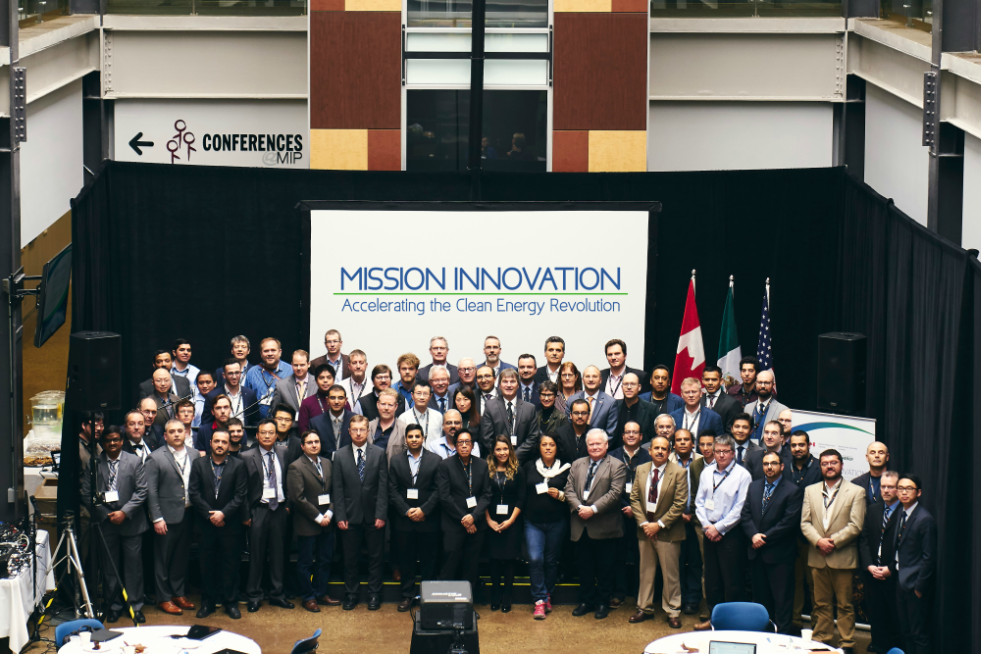McMaster hosts international workshop on climate change

Scientists, academics and experts from around the world gathered in Hamilton on March 15-16 to discuss how advances in clean energy materials can combat climate change.
More than 70 people attended the Clean Energy Materials Innovation Challenge Workshop at McMaster Innovation Park, the second in a series of international meetings.
Mission Innovation (MI) is a global initiative of 22 countries, including Canada, and the European Union to dramatically accelerate global clean energy innovation by driving research and development in key areas, such as sustainable biofuels, smart grids, off-grid access, carbon capture and clean energy materials.
Co-led by Natural Resources Canada (NRCan), the Secretaría de Energía (SENER) (Mexico), and the U.S. Department of Energy, the event identified critical research priorities and gaps in clean energy materials innovation and explored opportunities for deeper collaboration.
The invitation-only workshop, hosted by McMaster University’s Faculty of Engineering and the Canadian Institute for Advanced Research, examined advances in theoretical and applied physical chemistry/materials sciences, advanced computing, machine learning, and robotics. The goal? Speed up the time it takes to bring materials to market – materials that could improve energy conversion, transmission, and storage technologies, as well as energy use, all of which impact climate change.
“McMaster Engineering has made a strategic decision to pursue research that is both excellent and relevant to the major challenges that society faces,” said John Preston, Associate Dean of Research & External Relations, McMaster Engineering. “Climate change is one of the greatest problems facing our world, and we are glad to be part of a group of esteemed scientists working to address the issue.”
Several McMaster researchers, including Hatem Zurob, Sami Chidiac, Gary Purdy and Nabil Bassim, participated in panel discussions.
“Innovation is needed to solve grand challenges like climate change and grow a clean economy, and reducing the research and development cycle time can drastically help the process,” said Donna Kirkwood, Chief Scientist, Natural Resources Canada.
“The Government recognizes that such challenges demand transformative solutions, and MI represents an innovative approach to tackling them.”
“We are bringing together over 70 scientists from 9 countries with broad-ranging skills in materials theory, synthesis and characterization supported by computational strength,” said Mark Kozdras, Workshop Executive Chair and MI Clean Energy Materials Innovation Challenge Co-Lead.
“The question to be answered in this workshop is how the basic science of automated discovery of functional materials overlaps that of structural materials, and where we can leverage the computational tools and strategies to create a common end: clean energy.”
“Materials discovery is a key element of the innovation cycle of energy conversion, transmission, and storage technologies, as well as energy use,” said Hermann Tribukait, Workshop Executive Chair and MI Clean Energy Materials Innovation Challenge Lead.
“The objective of the Clean Energy Materials Innovation Challenge is to accelerate by 10x the innovation process for new, high-performance, low-cost clean energy materials.”
Attendees engaged in technical discussions on the state of the field, pre-competitive R&D opportunities, and promising R&D directions. The workshop included brief plenary presentations and emphasized small breakout group discussions.
The results and conclusions of this expert workshop will be published in a white paper that will complement the report from the first Clean Energy Materials Innovation Challenge Workshop, which took place in Mexico City in September 2017. The Mexico City and Hamilton workshops are providing input to inform MI countries’ decisions regarding research investments, tenders, and priorities in energy materials innovation.
A third workshop will be held in Toronto on May 9 focusing on industry involvement and uptake of the science and technologies discussed at the Mexico City and Hamilton workshops. Details on the Hamilton workshop can be found at http://ic6-2.mission-innovation.net/. Questions about the May workshop can be directed to engresearch@mcmaster.ca.


